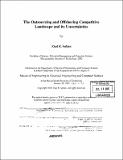| dc.contributor.advisor | Patrick Henry Winston. | en_US |
| dc.contributor.author | Sultan, Ziad R. (Ziad Raymond) | en_US |
| dc.contributor.other | Massachusetts Institute of Technology. Dept. of Electrical Engineering and Computer Science. | en_US |
| dc.date.accessioned | 2006-07-13T15:18:34Z | |
| dc.date.available | 2006-07-13T15:18:34Z | |
| dc.date.copyright | 2005 | en_US |
| dc.date.issued | 2005 | en_US |
| dc.identifier.uri | http://hdl.handle.net/1721.1/33366 | |
| dc.description | Thesis (M. Eng.)--Massachusetts Institute of Technology, Dept. of Electrical Engineering and Computer Science, 2005. | en_US |
| dc.description | Includes bibliographical references (leaf 42). | en_US |
| dc.description.abstract | The outsourcing and offshoring competitive landscape is rapidly and constantly evolving, presenting new challenges and opportunities for providers and customers alike. Outsourcing providers are pressured to increase the value delivered to clients. American providers are rushing offshore in an attempt to achieve savings through lower labor cost, while Indian providers are attempting to establish a stronger presence onshore, to capture a greater share of the high-value services market. Meanwhile, the importance of business processes is being emphasized at every level. These market forces add to the difficulty of reaching a coherent understanding of outsourcing as a whole. Market research and consulting reports address the different aspects of outsourcing in a very haphazard manner, and inexperienced customers are having difficulties formulating realistic expectations. Cost savings vary significantly from case to case, and many other factors need to be taken into account, such as the risk of intellectual property loss and hidden costs due to loss of flexibility, both of which can be hard to quantify. Benchmarks are being used extensively in the industry, and associated with penalties. While the use of benchmarks can be a powerful tool, clients need to remain flexible, or both parties could end up disappointed. | en_US |
| dc.description.statementofresponsibility | by Ziad R. Sultan. | en_US |
| dc.format.extent | 42 leaves | en_US |
| dc.format.extent | 1818079 bytes | |
| dc.format.extent | 1819731 bytes | |
| dc.format.mimetype | application/pdf | |
| dc.format.mimetype | application/pdf | |
| dc.language.iso | eng | en_US |
| dc.publisher | Massachusetts Institute of Technology | en_US |
| dc.rights | M.I.T. theses are protected by copyright. They may be viewed from this source for any purpose, but reproduction or distribution in any format is prohibited without written permission. See provided URL for inquiries about permission. | en_US |
| dc.rights.uri | http://dspace.mit.edu/handle/1721.1/7582 | |
| dc.subject | Electrical Engineering and Computer Science. | en_US |
| dc.title | The outsourcing and offshoring competitive landscape and its uncertainties | en_US |
| dc.type | Thesis | en_US |
| dc.description.degree | M.Eng. | en_US |
| dc.contributor.department | Massachusetts Institute of Technology. Department of Electrical Engineering and Computer Science | |
| dc.identifier.oclc | 62459561 | en_US |
